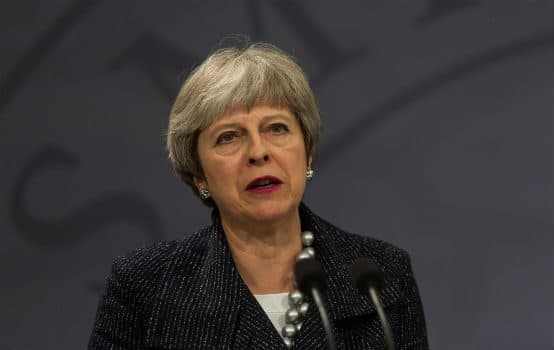
My editor at The American Conservative writes to ask: what is going on over there in the UK? It’s a good question. Since the Brexit referendum in 2016, my country has been going through what might be termed “a period of self-reflection.” A less generous description would be: “nervous breakdown.”
The newspapers are filled with increasingly frenzied pieces from writers on both the Left and the Right wondering what the rest of the world thinks of our small island. Are we “global Britain,” cocksure and cavalier? Or “little Britain,” timid and tame? Is everyone laughing at us? Or concerned that we have lost the plot? Have we lost the plot? Does anyone care? Do we even care?
Passing news events are now imagined to be grand tests of our country’s character. Take the awful story of Alfie Evans, a 23-month-old British boy with brain damage. Doctors and judges said he would never recover, so instead his life support should be switched off. His parents disagreed. They wanted to take him to Rome to be treated in a Vatican hospital. The Italians even granted Alfie Italian citizenship to expedite the process.
Would the young boy die on the terms of the British state or on those of his parents? In the end, it was the former. The complex, sad story made headlines in the United States and across Europe. Britain was portrayed as the cruel man leaving Europe: Protestant utilitarianism turning its back on Catholic compassion. Brits reacted to the international condemnation with wounded pride, a common national trait, and a grudging acceptance that maybe we have gone mad. So—have we become a callous, cold country? Was it British to let Alfie die against his parents’ wishes? Or is the British way to let the law decide? We don’t really know.

The Windrush scandal has also wounded British pride. During the Commonwealth Heads of Government visit last month, our Prime Minister Theresa May was forced to apologize to Caribbean leaders over deportation threats made to the children of Commonwealth citizens, who despite living and working in the UK for decades had been told they were living here illegally because of a lack of official paperwork. Is Britain now a racist country? No, screamed the Brexiteers, this isn’t what Brexit was meant to be about. Yes it was, squawked the Remainers. Amber Rudd, the home secretary, has now resigned over the scandal, making her the fourth member of May’s Cabinet to go in just six months. Our government appears to be crumbling to pieces. To settle the matter, the UN has sent a human rights experts to assess the situation. Tendayi Achiume, the UN Special Rapporteur on racism, arrives this week, and no doubt will be delighted to confirm our worst fears about our country.
Another test of national character came in the form of Theresa May’s decision to join the strikes in Syria alongside the U.S. and France. As any Brexiteer will tell you, the vote to leave the EU was about “taking back control,” which seemed to mean returning power to our parliament. But at the very point when May should have asked parliament about an act of war—even if she was not constitutionally obliged to—she chose not to. She went ahead regardless, despite polls suggesting the public were not at all convinced that throwing missiles at Assad was a good idea. May knew she couldn’t count on MPs to support her hawkish ambitions, but Number 10 was desperate not to be left out of the strikes agreed to by President Macron and President Trump. So do we now wage war to keep up appearances—and sod the national interest because the national image is more important? Did we really “take back control” only to forget what that means? And do we now do whatever the Americans—and, horror of horrors, the French—tell us to?
France isn’t helping to relieve Britain’s paranoia, especially with regards to Brexit, Trump, and that global superstar Monsieur Macron. The great fear here is that the UK-U.S. Special Relationship is deteriorating—or at the very least, not being nurtured. Macron, a fierce Brexit critic, has elegantly played on British insecurities by sidling up to the president of the United States. He’s Trump’s French poodle. But isn’t that our prime minister’s role? Did Theresa May’s tender hand-holding moment with President Trump mean absolutely nothing? It’s hard to exaggerate how quickly Brits can go from disgust at Trump to jealousy that France is muscling in on his affections.
At least we’ve managed to preserve our liberal values and free speech. Or have we? Brendan O’Neill recently documented in The Spectator all the recent examples of arrests made in the UK on the grounds of speech-related crimes. They included a Scottish man who had published a video of his girlfriend’s pug doing a Nazi salute, a teenage girl who quoted lyrics by the rapper Snap Dogg on Instagram, a Scottish man jailed for singing an offensive anti-Catholic song, a Christian preacher who told gay teenagers that homosexual sex is a sin, and the list goes on. A report revealed that the police are now making around nine arrests every day for offensive speech. Is Britain now a place where you can no longer say what you think? Is censorship a normal part of British life?
Add into the mix our feeling of impotence with regards to Russia following the Sergei Skripal poisoning, the prospect of a massive swing towards socialism with a Corbyn government, and the gnawing fear that the Queen may not be with us much longer, and you have a country beset by anxiety. The British have always been a little insane and we do tend to thrive on self-loathing, so perhaps it will all be okay. Nobody ever said Brexit would be easy. At least there is a royal wedding on the way. If that doesn’t lift our spirits, send for help.
Lara Prendergast is assistant editor for The Spectator.
Sourse: theamericanconservative.com






